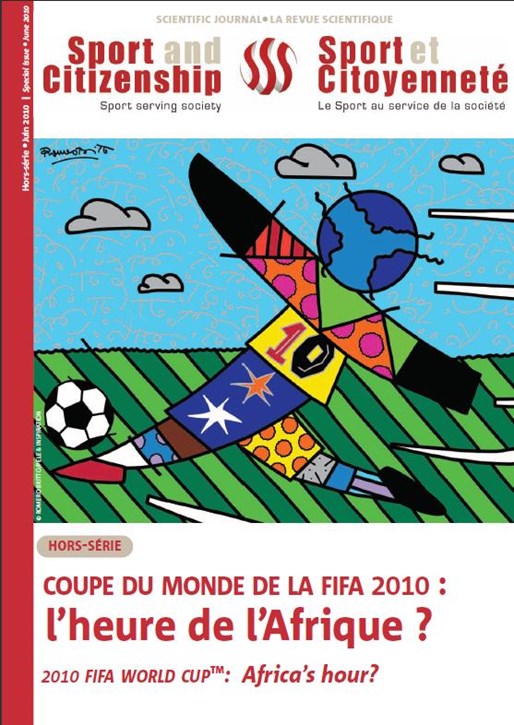Special edition journal: FIFA WORLD CUP - Africa’s hour?

Scientific journal from Sport et Citoyenneté on the 2010 FIFA World Cup in South Africa
15.06.2010
By Play the GameThis historic FIFA World Cup challenges the Sport and Citizenship think tank to reflect on various issues: the social responsibility of sports federations, the influence of football on world geopolitics, citizenship activity linked to the event, the veracity of criticism aimed at FIFA and other important social issues.
Responsible politicians, representatives from the world of sport and renowned scientists have all contributed their knowledge and expertise to help clarify the issues surrounding this multi-faceted tournament.
Contributions Include:
- Editorial by Joseph Blatter, President of FIFA
- Interview with Andris Piebalgs, European Commissioner for Development, about sport and its possible role in development
- Interview with Pierre Sané, Assistant Director General for Social and Human Sciences, on UNESCO’s work with sport and rapprochement of cultures
- Wilfried Lemke, Special Adviser to the United Nations Secretary-General on sport for Development and peace, reflects on the legacy of the World Cup in South Africa and Africa
- Horst R. Schmidt, Senior Vice President of the Local Organising Committee for the 2006 FIFA World Cup in Germany, discusses the challenges of an event such as the World Cup
- Iva Zanicchi, Member of European Parliament, Vice-chair of the Committee on Development, reflects on what football and the 2010 World Cup means for Africa
- Pascal Bomiface, Director of the Institute for International and Strategic Relations, discusses the organization of the World Cup and calls it a test for Africa
- Lassana Palenfo, President of the Association of African National Olympic Committees, reflects on the boost the World Cup might be expected to give Africa
- Santiago Nolla Zayas, President of the International Association of Sports Newspapers (IASN), reflects on what Africa might get out of the World Cup
- Joel Bouzou, President and Founder of Peace and Sport, reflects on the World Cup’s ability to become a catalyst for progress for Africa - IF the impact of the event becomes part of a long-term perspective
- Interview with Federico Addiechi, FIFA’s Head of Corporate Social Responsibility, who talks about FIFA’s humanitarian activities and the Football for Hope project
- Wladimir Andreff, Professor Emeritus in Economical Sciences, and Madeleine Andreff, Expert in Econometrics, present an abstract of their scientific study which takes into account a multitude of socio-economic variables and aims at modeling the results of the next FIFA World Cup
- Declan Hill, Investigative Journalist, reflects on racism and corruption in football
- Jiri Dvorak, FIFA’s Chief Medical Officer, shares his medical vision of the event and the possibility to use the event to promote prevention
- Interview with Elizabeth Sidiropoulos, National Director of the South African Institute of International Affairs (SAIIA), who talks about the challenge for the hosting country to overcome barriers and stereotypes that are often associated with Africa
- Raffaele Poli, Institute of Sports Sciences - University of Lausanne, looks at the World Cup as an opportunity to initiate essential reforms that focus on giving better possibilities to young African football talents
- Matthijs Huizing, Director of Right to Play in the Netherlands, reflects on the potential of the World Cup to put focus on grassroot projects and their impact
- Anna Semens, Deputy Director, and Simon Chadwick, Director of Centre for the International Business of Sport, Coventry University, discuss the many challenges that remain to be overcome in order for the region to take advantage of the World Cup
- Colin Miege, Co-director of Sport and Citizenship’s Scientific Committee, reflects on trafficking of young sports players from Third World countries
- Interview with Alain Cadec, MEP and Member of the Delegation for Relations with South Africa, who talks about the World Cup and the unique opportunity it provides for South Africa to build relations abroad
- Romero Britto, Brazilian artist, painter and sculptor, talks about his official paintings which are used for the 2010 World Cup
- Robert Holloway, Director of the AFP Foundation, emphasizes the role and importance of journalists in developing countries
- Emmanuel Seuge, Director of Coca-Cola Worldwide Sports and Entertainment Marketing, explains the reasons behind Coca-Cola Company's commitment in the world of sport.
http://www.sportetcitoyennete.org/userfiles/image/revue_speciale_CM_2010.pdf





